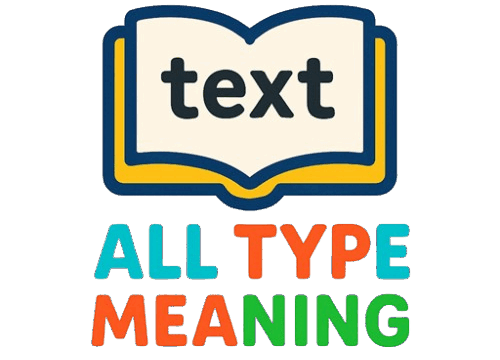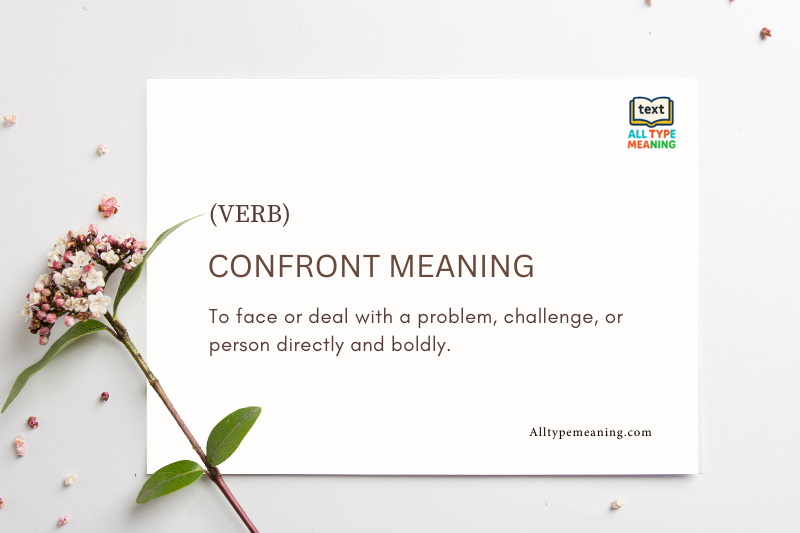Have you ever wondered about the confront meaning and how to use this powerful word correctly? 🤔 Whether you’re a student preparing for exams, a professional looking to enhance your vocabulary, or someone curious about language nuances, understanding the word “confront” is essential for effective communication.
The word “confront” is more than just a simple verb – it carries deep emotional and practical significance in our daily conversations. From facing challenges head-on to addressing difficult situations, this versatile word appears frequently in literature, business communications, and everyday speech.
In this comprehensive guide, we’ll explore every aspect of confront meaning, including its definitions in multiple languages like Hindi, Tamil, Telugu, and Bengali. We’ll also provide practical examples, synonyms, antonyms, and real-world applications that will help you master this important word. 📖
What Does Confront Mean? Basic Definition and Core Understanding 🎯
The confront meaning in its simplest form refers to the act of facing someone or something directly, especially in a challenging or difficult situation. When you confront something, you’re not avoiding or running away – you’re meeting it head-on with courage and determination.
Primary Definitions of Confront:
1. To face boldly or defiantly 💥 When you confront a problem, you tackle it directly rather than ignoring it. For example: “She decided to confront her fear of public speaking by joining a debate club.”
2. To meet face-to-face 👥 This involves coming into direct contact with someone, often for a serious discussion. Example: “The manager will confront the employee about their poor performance.”
3. To present for acknowledgment or judgment ⚖️ This means bringing something to someone’s attention that they must deal with. Example: “The evidence confronted him with the truth about his actions.”
4. To stand opposite to or face 🪞 In a physical sense, confront can mean to be positioned directly in front of something. Example: “The protesters confronted the government building.”
Etymology and Word Origin 📚
The word “confront” comes from the Latin word “confrontare,” which means “to border on” or “to face.” It entered English in the 16th century and has evolved to carry stronger emotional and confrontational meanings over time.
The prefix “con-” means “with” or “together,” while “front” relates to the forefront or face. Together, they create the sense of bringing faces together or meeting directly.
Confront Meaning in Different Languages: Hindi, Tamil, Telugu, and Bengali 🌍
Understanding confront meaning in Hindi, Tamil, Telugu, and Bengali helps millions of learners grasp this concept in their native languages. Let’s explore these translations with cultural context.
Confront Meaning in Hindi 🇮🇳
Hindi Translation: सामना करना (Saamna karna), मुकाबला करना (Muqabla karna)
Detailed Hindi Meanings:
- सामना करना – To face something directly
- टकराना – To clash or collide with
- मुठभेड़ करना – To have an encounter
- आमने-सामने आना – To come face to face
Example in Hindi: “उसे अपनी समस्याओं का सामना करना पड़ा।” Translation: He had to confront his problems.
Confront Meaning in Tamil 🌴
Tamil Translation: எதிர்கொள் (Ethirkol), முகம் கொடு (Mukam kodu)
Detailed Tamil Meanings:
- எதிர்கொள்ளுதல் – Facing or encountering
- நேருக்கு நேர் வருதல் – Coming face to face
- சவால் விடுதல் – Challenging
Example in Tamil: “அவன் தன் பயத்தை எதிர்கொள்ள வேண்டும்।” Translation: He needs to confront his fear.
Confront Meaning in Telugu 📿
Telugu Translation: ఎదుర్కొను (Edurkonu), ఎదురుచూడు (Eduruchudu)
Detailed Telugu Meanings:
- ఎదుర్కొనుట – To face or encounter
- నేరుగా ఎదుర్కొనుట – To face directly
- సవాలు చేయుట – To challenge
Example in Telugu: “ఆమె తన కష్టాలను ఎదుర్కొంది।” Translation: She confronted her difficulties.
Confront Meaning in Bengali 🐅
Bengali Translation: মুখোমুখি হওয়া (Mukhomukhi howa), সম্মুখীন হওয়া (Sommukheen howa)
Detailed Bengali Meanings:
- মোকাবেলা করা – To deal with or tackle
- প্রতিরোধ করা – To resist or oppose
- সরাসরি মোকাবিলা – Direct confrontation
Example in Bengali: “তাকে সত্যের মুখোমুখি হতে হবে।” Translation: He will have to confront the truth.
Types of Confrontation: Different Ways to Use “Confront” 🔥
Understanding the various contexts where we use confront meaning helps you apply this word more effectively in different situations.
1. Personal Confrontation 👤
This involves facing personal challenges, fears, or internal conflicts.
- Example: “Maria had to confront her anxiety before the job interview.”
- Usage: Personal growth, self-improvement contexts
2. Interpersonal Confrontation 👥
When two or more people address conflicts or issues directly.
- Example: “The couple decided to confront their marriage problems through counseling.”
- Usage: Relationship discussions, workplace conflicts
3. Social Confrontation 🏛️
Addressing broader societal issues or injustices.
- Example: “The activists confronted the government about environmental policies.”
- Usage: Political movements, social justice contexts
4. Professional Confrontation 💼
Workplace situations requiring direct address of issues.
- Example: “The CEO confronted the board about the company’s declining profits.”
- Usage: Business meetings, performance reviews
5. Emotional Confrontation 💝
Dealing with feelings and emotional challenges.
- Example: “He finally confronted his grief after losing his father.”
- Usage: Therapy, personal development, healing processes
Practical Examples and Usage in Everyday Life 🌟
Let’s explore how confront meaning applies in real-world scenarios that students and professionals encounter regularly.
Academic Examples 📖
Literature Class: “In Shakespeare’s Hamlet, the protagonist must confront his father’s ghost and the truth about his murder.” This shows how confront is used in literary analysis.
History Studies: “Gandhi chose to confront British rule through non-violent resistance.” Here, confront means to challenge or oppose a system.
Psychology: “Cognitive Behavioral Therapy helps patients confront their negative thought patterns.” This demonstrates therapeutic usage.
Professional Examples 💼
Business Meeting: “We need to confront the budget shortfall before it affects our operations.” This shows problem-solving context.
Human Resources: “The HR manager will confront the employee about attendance issues.” This represents direct communication about performance.
Legal Context: “The prosecutor confronted the witness with contradictory evidence.” This shows challenging someone with facts.
Daily Life Examples 🏠
Family Situations: “Parents sometimes need to confront their children about inappropriate behavior.” This demonstrates disciplinary contexts.
Personal Growth: “She confronted her fear of heights by taking rock climbing lessons.” This shows overcoming personal limitations.
Social Situations: “He confronted his friend about spreading rumors.” This represents addressing relationship issues.
Synonyms and Antonyms: Expanding Your Vocabulary Arsenal 📚
Understanding words similar to and opposite of Confront Meaning enhances your vocabulary and communication skills.
Powerful Synonyms for Confront ⚡
Strong Synonyms:
- Challenge – To dispute or call into question
- Face – To meet directly or deal with
- Encounter – To come across or meet unexpectedly
- Oppose – To resist or confront in disagreement
- Tackle – To deal with or address directly
Moderate Synonyms:
- Address – To deal with or speak to
- Meet – To come into contact with
- Approach – To come near or deal with
- Handle – To manage or deal with
- Engage – To become involved with
Formal Synonyms:
- Accost – To approach boldly or aggressively
- Brave – To face courageously
- Defy – To challenge openly
- Withstand – To resist or confront successfully
Clear Antonyms for Confront ❌
Direct Opposites:
- Avoid – To stay away from or prevent
- Evade – To escape or avoid cleverly
- Flee – To run away from
- Ignore – To pay no attention to
- Retreat – To move back or withdraw
Behavioral Opposites:
- Submit – To give in or surrender
- Yield – To give way or surrender
- Surrender – To give up or admit defeat
- Concede – To admit or acknowledge defeat
Common Mistakes and How to Avoid Them ⚠️
Many learners make specific errors when using confront meaning in sentences. Let’s identify and correct these common mistakes.
Mistake 1: Incorrect Preposition Usage ❌
Wrong: “She confronted with her boss about the salary.” Correct: “Se confronted her boss about the salary.” Rule: Don’t use “with” after confront when referring to a person.
Mistake 2: Passive Voice Confusion ❌
Wrong: “The problem was confronted by him.” Better: “He confronted the problem.” Rule: Active voice sounds more natural and direct with “confront.”
Mistake 3: Missing Object ❌
Wrong: “I will confront tomorrow.” Correct: “I will confront the issue tomorrow.” Rule: Confront usually needs an object (what you’re confronting).
Mistake 4: Overuse in Formal Writing ❌
Overused: “The student confronted the difficult math problem, then confronted the next chapter, and finally confronted the homework.” Better: “The student tackled the difficult math problem, then approached the next chapter, and finally completed the homework.” Rule: Vary your vocabulary to avoid repetition.
Conclusion: Master the Power of Confrontation in Your Communication 🚀
Understanding confront meaning empowers you to communicate more effectively and face life’s challenges with confidence. This versatile word serves as a bridge between avoiding problems and addressing them directly, making it essential for students, professionals, and anyone seeking to improve their English vocabulary.
Remember that confronting doesn’t always mean fighting – it means facing reality, addressing issues, and taking control of difficult situations. Whether you’re using confront meaning in Hindi, Tamil, Telugu, or Bengali, the core concept remains the same: courage to face what needs to be faced.
As you continue your language learning journey, practice using “confront” in different contexts. Start with small, everyday situations before tackling more complex scenarios. The more you use this powerful word correctly, the more natural it will become in your vocabulary arsenal.💪
If you enjoyed this guide, you may also like our article on Exacerbate Meaning, another powerful English word that expresses urgency and intensity.
Frequently Asked Questions (FAQs) about Confront Meaning 🤷♀️
1. What is the exact confront meaning in simple English? 🎯
A: The confront meaning is to face someone or something directly, especially when it’s difficult or challenging. It means not avoiding or running away from a problem, person, or situation, but dealing with it head-on. For example, if you have a fear of dogs, confronting that fear means facing dogs despite being scared.
2. How do you use confront in a sentence correctly? ✏️
A: To use confront correctly, remember it’s a transitive verb that needs an object. The basic structure is: Subject + confront + object + (optional prepositional phrase). Examples: “I confronted my neighbor about the noise” or “She confronted her fears during therapy.” Always specify what or whom you’re confronting.
3. What’s the difference between confront and face? 🤔
A: While both words mean to deal with something directly, confront often implies a more intense, challenging, or potentially conflicting situation. “Face” is gentler and more neutral. You might “face a decision” but “confront an enemy.” Confront suggests more emotional intensity or difficulty than face.
4. Is confront always negative or aggressive? 😠
A: No! While confront meaning can involve conflict, it doesn’t have to be aggressive. You can confront problems, challenges, fears, or truths in a calm, constructive way. Confronting issues early often prevents bigger problems later. The key is addressing something directly rather than avoiding it, regardless of your emotional approach.
5. Can you confront yourself? 🪞
A: Absolutely! Self-confrontation is very common and healthy. You can confront your own fears, weaknesses, mistakes, or bad habits. Examples include: “He confronted his addiction,” “She confronted her negative self-talk,” or “I need to confront my procrastination.” This type of self-reflection is essential for personal growth and development.
**Keep learning and exploring new concepts to expand your knowledge horizon! Visit All Type Meaning for more comprehensive guides on important terms and concepts. 🚀

